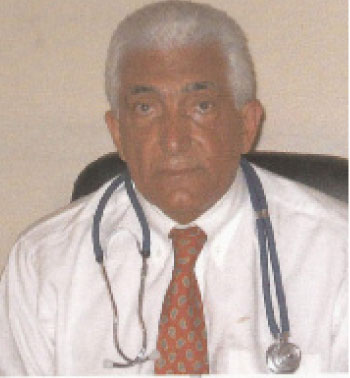
Within the framework of the World Health Organization’s (WHO) definition of health as a state of complete physical, mental and social well-being, and not merely the absence of disease or infirmity, reproductive health, or sexual health/hygiene, addresses the reproductive processes, functions and system at all stages of life.
Reproductive health, therefore, implies that people are able to have a responsible, satisfying and safer sex life and that they have the capability to reproduce and the freedom to decide if, when and how often to do so.
One interpretation of this implies that men and women ought to be informed of and to have access to safe, effective, affordable and acceptable methods of birth control; also access to appropriate health care services of sexual, reproductive medicine and implementation of health education programs to stress the importance of women to go safely through pregnancy and childbirth could provide couples with the best chance of having a healthy infant.
On the other hand, individuals do face inequalities in reproductive health services. Inequalities vary based on socioeconomic status, education level, age, ethnicity, religion, and resources available in their environment. It is possible for example, that low income individuals lack the resources for appropriate health services and the knowledge to know what is appropriate for maintaining reproductive health.
Well, Dr Hassan Azadeh is this week focusing on one of the most important health concerns as important as Reproductive Health and high lights the way of life-saving.
Reproductive health simply refers to healthy reproductive organs with normal functions. However, it has a broader perspective and includes the emotional and social aspects of reproduction.
Sexual health
Sexuality is a big part of being human. Love, affection and sexual intimacy all play a role in healthy relationships. They also contribute to your sense of well-being. A number of disorders can affect the ability to have or enjoy sex in both men and women. Concerns about infertility or fear of unplanned pregnancy can also come into play.
In addition, a number of diseases and disorders affect sexual health. These include sexually and cancer. In men, treatment of prostate cancer can cause erectile dysfunction. In women, cervical, uterine, vaginal, l or ovarian cancer may have sexual effects.
An unofficial working definition for sexual health is that “Sexual health is a state of physical, emotional, mental and social well-being in relation to sexuality; it is not merely the absence of disease, dysfunction or infirmity. Sexual health requires a positive and respectful approach to sexuality and sexual relationships, as well as the possibility of having pleasurable and safe sexual experiences, free of coercion, discrimination and violence.
For sexual health to be attained and maintained, the sexual rights of all persons must be respected, protected and fulfilled.” However, while used by WHO as well as other organizations, this is not an official WHO position, and should not be used or quoted as a WHO definition.
The WHO website defines Sexual Health as: “Sexual health is a state of physical, mental and social well-being in relation to sexuality. It requires a positive and respectful approach to sexuality and sexual relationships, as well as the possibility of having pleasurable and safe sexual experiences, free of coercion, discrimination and violence.”
Childbearing and health
Early childbearing and other behaviors can have health risks for women and their infants. Waiting until a woman is at least 18 years old before trying to have children improves maternal and child health. If an additional child is to be conceived, it is considered healthier for the mother, as well as for the succeeding child, to wait at least 2 years after the previous birth before attempting to conception. After a fetal fatality, it is healthier to wait at least 6 months.[7]
The WHO estimates that each year, 358 000 women die due to complications related to pregnancy and childbirth; 99% of these deaths occur within the most disadvantaged population groups living in the poorest countries of the world. Most of these deaths can be avoided with improving women’s access to quality care from a skilled birth attendant before, during and after pregnancy and childbirth.
Sexuality is a big part of being human. Love, affection and sexual intimacy all play a role in healthy relationships. They also contribute to your sense of well-being. A number of disorders can affect the ability to have or enjoy sex in both men and women. Concerns about infertility or fear of unplanned pregnancy can also come into play.
In addition, a number of diseases and disorders affect sexual health. These include sexually and cancer. In men, treatment of prostate cancer can cause erectile dysfunction. In women, cervical, uterine, vaginal, l or ovarian cancer may have sexual effects.
Reproductive Health and Sexually Transmitted Diseases
Sexually transmitted diseases (STDs) are caused by infections that are passed from one person to another during sexual contact.
These infections often do not cause any symptoms. Medically, infections are only called diseases when they cause symptoms. That is why STDs are also called “sexually transmitted infections.” But it’s very common for people to use the terms “sexually transmitted diseases” or “STDs,” even when there are no signs of disease.
There are many kinds of sexually transmitted diseases and infections. And they are very common — more than half of all of us will get one at some time in our lives.
The good news is we can protect ourselves and each other from STDs. Practicing safer sex allows you to reduce your risk of getting sexually transmitted diseases. And if you’ve done anything that puts you at risk of infection, getting tested allows you to get any treatments you may need.
Gender and human rights
Sexual health is influenced by a complex web of factors ranging from sexual behaviour and attitudes and societal factors, to biological risk and genetic predisposition. It encompasses the problems of HIV and STIs/RTIs, unintended pregnancy and abortion, infertility and cancer resulting from STIs, and sexual dysfunction. Sexual health can also be influenced by mental health, acute and chronic illnesses, and violence.
Addressing sexual health at the individual, family, community or health system level requires integrated interventions by trained health providers and a functioning referral system. It also requires a legal, policy and regulatory environment where the sexual rights of all people are upheld.
Addressing sexual health also requires understanding and appreciation of sexuality, gender roles and power in designing and providing services. Understanding sexuality and its impact on practices, partners, reproduction and pleasure presents a number of challenges as well as opportunities for improving sexual and reproductive health care services and interventions.
Validity of data collection, given researcher bias and difficulties in discussing such a private issue, also remains a problem in some settings that must be overcome if a greater understanding of sexuality in various settings is to be achieved. Sexuality research must go beyond concerns related to behaviour, numbers of partners and practices, to the underlying social, cultural and economic factors that make individuals vulnerable to risks and affect the ways in which sex is sought, desired and/or refused by women, men and young people.
Investigating sexuality in this way entails going beyond reproductive health by looking at sexual health holistically and comprehensively. To do this requires adding to the knowledge base gained from the field of STI/HIV prevention and care, gender studies, and family planning, among others.
MAKING PREGNANCY SAFER
Worldwide, one woman dies every minute as result of being pregnant. This statistic highlights the denial of women’s rights to safe motherhood in many parts of the world, particularly in low-resource countries where 98% all maternal deaths occur. The majority of pregnant women die because they deliver unattended by a properly trained birth professional.
According to the 1948 Universal Declaration of Human Rights, every woman has the right to a standard of living adequate for the health and well-being of herself and her family, including medical care.
The principle of moral philosophy supporting women’s rights to safe motherhood may be difficult to implement. Philanthropy is diverted by other competing needs, such as HIV prevention and treatment, or provision of urgent food supplies. Equity is denied because women’s health is too often set as a low priority.
For further information visit the Governments Hospitals and Clinics, Ministry of Health and Social Welfare, NGOs and private clinics. You can also call Afri-radio live health show with Dr Azadeh every Wednesday from 9-9.30 am and send e-mail azadehhassan@yahoo.co.uk or send text to 002207774469.


